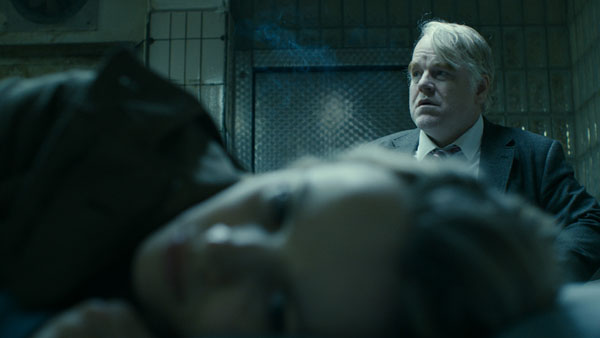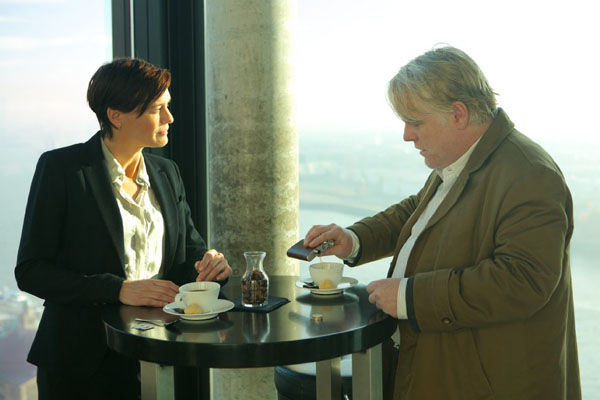“Anton Corbijn’s adaptation of the 2008 John Le Carré novel, A Most Wanted Man (Grade: B-), isn’t likely to get the heart racing, though it could succeed in making it feel pretty heavy,” suggests the AV Club‘s A.A. Dowd. “Corbijn (Control, The American) expertly captures the spirit of the author’s writing—a melancholy resignation about the state of the world, a vision of intelligence officers as weary loners disillusioned about the value of their work. The trouble is that the director has tackled what seems, at least as translated, like lesser Le Carré.”
German intelligence officer Gunther Bachmann (Philip Seymour Hoffman) “is on the trail of a Issa Karpov (Grigoriy Dobrygin), a Chechen asylum seeker and suspected terrorist, in town to access his dead father’s bank account,” explains the Guardian‘s Xan Brooks. “Our hero thinks that his quarry is innocent, but that’s beside the point. Karpov is the minnow that will trap the barracuda that will in turn trap the shark. Specifically, Gunther wants to use him as the lure to get to Faisal Muhammad (Homayoun Ershadi), a shady benefactor who may just be siphoning funds to al-Qaida. Poor Karpov and Annabel (Rachel McAdams), his human rights lawyer, are reduced to pieces on a chessboard, moved this way and that by Gunther’s yellowed fingers. The drama unfolds in a series of hushed conversations and covert meetings, all of which are overseen by the most conspicuous set of spies this side of Austin Powers. They might as well be wearing T-shirts reading,
‘Hi! I’m a Spy!’. I only wish the film stood out in a similar fashion.”
“A Most Wanted Man is methodical and gripping for the first hour, and a pretty good suspense drama for the second,” finds the Boston Globe‘s Ty Burr. “Corbijn has yet to learn how to vary, sustain, and build dramatic pacing over a film’s long haul. Still, this is clearly European le Carré rather than Hollywood, with a greater interest in process, disappointment, and existential blondes. Corbijn loves the bone structure of an actress like Nina Hoss almost as much as he loves the post-modern architecture of Hamburg; both offer a tensely beautiful framework over which he can stretch le Carre’s moves and countermoves.”
“[S]ome may leave a slow-burning, understated spy caper like A Most Wanted Man wondering if it wouldn’t have been better served as a limited series on Netflix or HBO,” supposes Cory Everett at the Playlist. “Like all of Corbijn’s work, it is incredibly handsomely produced—the cinematography by Benoît Delhomme (Lawless, The Proposition) is typically gorgeous—and it has the feel of a tense and moody European caper, but the whole thing feels a bit slight. Not as arty as The American or Tinker Tailor Soldier Spy or as soapy and quickly paced as its small screen counterparts, A Most Wanted Man is left somewhere in the middle. The finale stings admirably but you can’t help but wonder what happens next week.”
Update: “Up until its grimly compelling final stretch, when the pieces of Bachmann’s plan are finally aligned and set in motion, A Most Wanted Man is not an action movie in any conventional sense,” writes Variety‘s Justin Chang. “Thinking and talking are its primary modes of action; the most startling thing we see is a character getting snatched and thrown into the back of a van. If there’s a thrill here, it’s not so much in the plot’s gradual accumulation of twists and turns, but rather in the way le Carré’s bleak, unyielding worldview seeps into your nervous system. Chilly as that sounds, Corbijn brings a sympathetic touch to even the seemingly least significant characters.”
Updates, 1/21: In Contention‘s Guy Lodge notes that A Most Wanted Man is “the first big-screen adaptation of a John Le Carré novel since Tomas Alfredson’s Tinker Tailor Soldier Spy in 2011, and a worthy spiritual successor to that tangled, tea-stained tale of world-weary espionage. The difference, however, is that we’re long past the Cold War’s big thaw in this particular story: post-9/11 paranoia is the order of the day, though Le Carré’s typically dry, rueful tone and Corbijn’s pewter-colored aesthetic combine to suggest the shift is immaterial: the more things change, the more they stay the same, and political distrust springs eternal.”
“The material is a natural fit for director Anton Corbijn, who seems to like directing films about slowly fitting together seemingly disparate pieces just as much as le Carré likes writing material with the same sense of style and pacing,” writes Kate Erbland. Her grade at Film.com: 8.3/10.
“The sharply written script by Andrew Bovell (Lantana) keeps the tension taught and the plot shifting,” writes Anthony Kaufman for Screen Daily. And “like the best works of le Carré, it takes you on a sly and acerbic trip, full of both triumph and failure.”
Viewing (3’51”). Hoffman, Dafoe and McAdams talk to Variety.
Update, 1/31: For Tim Grierson, writing for Paste, “when the film reaches its final stretches, it’s extraordinarily gripping. The film’s confident tonal control is a compliment to Corbijn’s skill, but it’s also recognition of Philip Seymour Hoffman’s wonderfully controlled central performance. You don’t realize how stunning the whole experience really was until it’s over.”
For news and tips throughout the day every day, follow @KeyframeDaily on Twitter and/or the RSS feed. Get Keyframe Daily in your inbox by signing in at fandor.com/daily.





